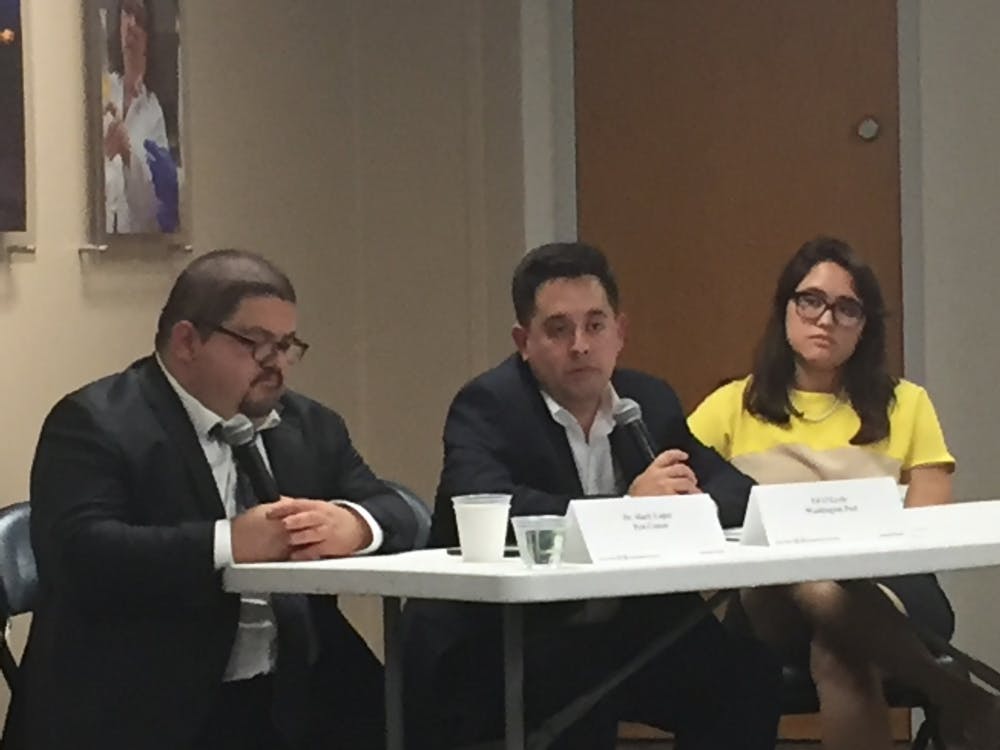Latino voting experts have a clear message for the presidential candidates: pay more attention to Latinos. Latinos could be as influential to the election’s outcome as African-Americans in 2008, speakers said during the AU panel “Latinos/as in the Upcoming Election” on Oct. 17.
The panel focused on the influence and importance of the Latino vote in the 2016 presidential election and its influence as a whole on the future of the American electorate. It was hosted by Marcy Campos, director of the Center for Community Engagement & Service, and Dr. Salvador Vidal-Ortiz of the Department of Sociology.
Guest panelists included Dr. Mark Hugo Lopez, Director of Hispanic Research at Pew Research Center, Ed O’Keefe, AU alumni and Washington Post reporter, and Valeria Ojeda-Avitia, a senior in the School of International Services and the president of Kennedy Political Union and leader of AU TurboVote.
O’Keefe spoke about the rhetoric and tone of Hispanic voters that he has witnessed over the past two years while covering the presidential election. Being Guatemalan, O’Keefe shared his interest on the idea that the Hispanic vote could have a significant impact in these elections- but only if they actually vote.
“Trump’s rhetoric around the Hispanic community has definitely brought an uptick in awareness, causing people to be more engaged and more involved and eager to turn out,” O’Keefe said. “And yet I have never seen Hispanics less enthusiastic about a big election.”
The work that Lopez conducts at Pew, a nonpartisan, non-advocacy “fact tank” based in D.C., includes studies and research about trends in the Hispanic/Latino community, including the organization’s most recent report about the Latino vote in the upcoming election.
A staggering 44 percent of the 27.3 million eligible Hispanic voters in the upcoming election are millennials or people ages 18 to 35, Lopez reported. He also said that Hispanic voters are more in favor of Hillary Clinton, but over two-thirds of millennial Hispanics say their vote for Clinton is actually just a vote against Donald Trump.
The opposite is true for older Hispanics, where 65 percent of voters say that their vote for Clinton is for her. The “Trump Effect” may possibly drive support for people to vote against him due to his harsh rhetoric of Hispanics of all ethnic groups.
O’Keefe told stories of the young Latinos he has met along his travels the past year who express frustration over the nomination of “two sixty-somethings with unnaturally blond hair, who made a name for themselves in the early 1990s when these kids were in diapers, or not even alive,” O’Keefe said. “Trump and Clinton are from the VCR-era, when right now, we’re living in the DVR-era.”
The effect of these two candidates could be “lethal” on voter registration in the battleground state of Florida, according to O’Keefe, where 34 percent of voters in that state were registered as “no party affiliate,” with 33 percent of Hispanic young voters registered as independents.
Finally, Ojeda-Avitia shared her passion about the right to vote. Growing up in New Mexico, she learned that her parents were undocumented in high school.
Ojeda-Avitia has dedicated her time to establishing TurboVote on campus. This program has registered approximately 1,000 students online this fall by hosting events around campus each week, according to Ojeda-Avitia.
“I strongly believe in standing by a candidate and within the party,” said Ojeda-Avitia. “I think we should be really excited [to vote] because this is the first time that a majority of millennials are able to vote, so the first time that all of us are able to make a huge change.”
She said that even though the youth vote has been strong in the past, the impact that young voters will have in this election is “unquestionable.”
Ojeda-Avitia also noted that for students who have missed out on voting on an absentee ballot in their home state, D.C. has same-day registration on election day, which gives all eligible AU students the chance to exercise their right to vote.
The panel opened up to an audience discussion about voting trends for Latinos, not just in this presidential race, but in elections throughout the country. O’Keefe showed his political prowess with his knowledge of Hispanic politicians all around the U.S., but noted that in the DMV area, there is an extreme lack of Latino representation in the political system.
“I think it’s wonderful and absolutely important [to talk about Hispanic voters] because sometimes we make assumptions about different groups of people,” Vidal-Ortiz said. “The University is taking a turn for the better in terms of thinking about diversity and inclusion, and part of what makes this [event] wonderful is that students are able to hear very specific aspects of the Latino community.”





